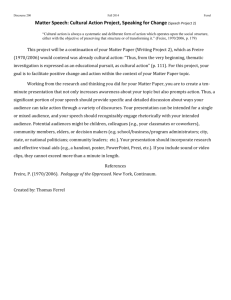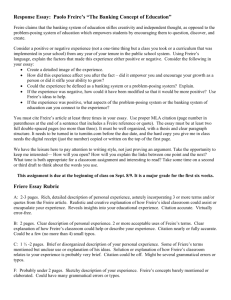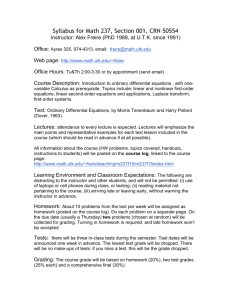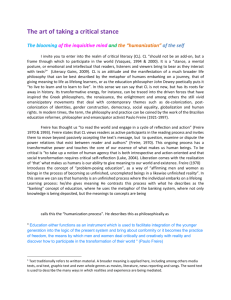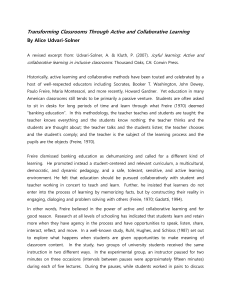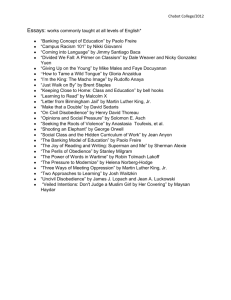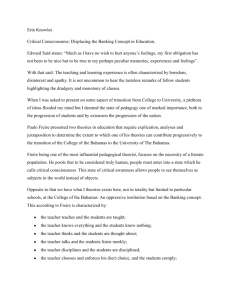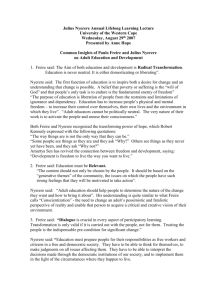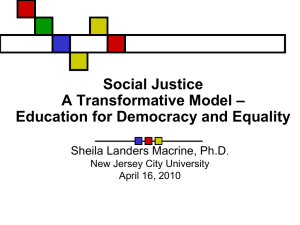Socratic Dialectics and the Banking Concept of Education: a
advertisement
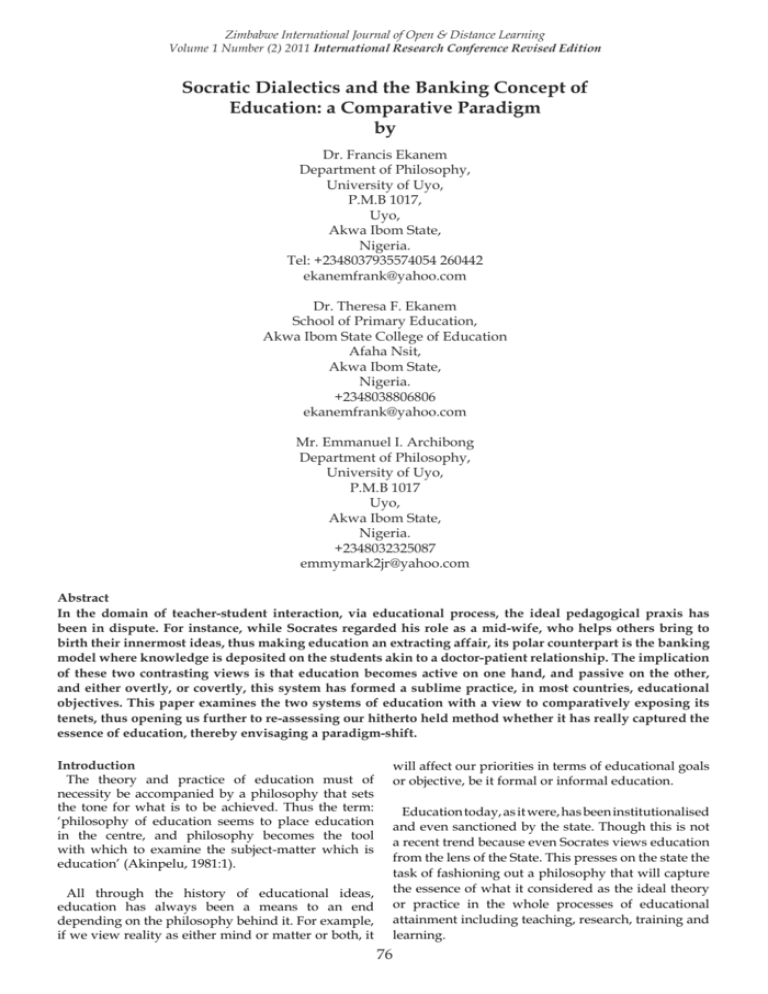
Zimbabwe International Journal of Open & Distance Learning Volume 1 Number (2) 2011 International Research Conference Revised Edition Socratic Dialectics and the Banking Concept of Education: a Comparative Paradigm by Dr. Francis Ekanem Department of Philosophy, University of Uyo, P.M.B 1017, Uyo, Akwa Ibom State, Nigeria. Tel: +2348037935574054 260442 ekanemfrank@yahoo.com Dr. Theresa F. Ekanem School of Primary Education, Akwa Ibom State College of Education Afaha Nsit, Akwa Ibom State, Nigeria. +2348038806806 ekanemfrank@yahoo.com Mr. Emmanuel I. Archibong Department of Philosophy, University of Uyo, P.M.B 1017 Uyo, Akwa Ibom State, Nigeria. +2348032325087 emmymark2jr@yahoo.com Abstract In the domain of teacher-student interaction, via educational process, the ideal pedagogical praxis has been in dispute. For instance, while Socrates regarded his role as a mid-wife, who helps others bring to birth their innermost ideas, thus making education an extracting affair, its polar counterpart is the banking model where knowledge is deposited on the students akin to a doctor-patient relationship. The implication of these two contrasting views is that education becomes active on one hand, and passive on the other, and either overtly, or covertly, this system has formed a sublime practice, in most countries, educational objectives. This paper examines the two systems of education with a view to comparatively exposing its tenets, thus opening us further to re-assessing our hitherto held method whether it has really captured the essence of education, thereby envisaging a paradigm-shift. Introduction The theory and practice of education must of necessity be accompanied by a philosophy that sets the tone for what is to be achieved. Thus the term: ‘philosophy of education seems to place education in the centre, and philosophy becomes the tool with which to examine the subject-matter which is education’ (Akinpelu, 1981:1). will affect our priorities in terms of educational goals or objective, be it formal or informal education. Education today, as it were, has been institutionalised and even sanctioned by the state. Though this is not a recent trend because even Socrates views education from the lens of the State. This presses on the state the task of fashioning out a philosophy that will capture the essence of what it considered as the ideal theory or practice in the whole processes of educational attainment including teaching, research, training and learning. All through the history of educational ideas, education has always been a means to an end depending on the philosophy behind it. For example, if we view reality as either mind or matter or both, it 76 Zimbabwe International Journal of Open & Distance Learning Volume 1 Number (2) 2011 International Research Conference Revised Edition Thus when we examine Plato dialectics, we will find out that ‘they present no finished cut and dried system of philosophy of education’ (Curtis and Boultwood, 1977:3). Socrates was not a system maker. He was convinced that the truth about the things which really matter cannot be obtained ready made. It comes as a result of thought and discussion. A definition can also be pragmatic, that is, take on a moral dimension in stating what it should do to benefit society. An example is ‘Education should prepare its beneficiaries to be of good behaviour’. Granted that we can have several perspectives to the definition of education, Sternberg (1968) on his part painted this utilitarian picture of education thus: ‘...People have aims and purposes. Education is not a person, it is not a thing. However, like a thing it has uses. The purposes of education are the uses that people would have for education (3).’ On the other hand, Freire (2005), who really exposed the banking concept of education, opines that: ...A careful analysis of the teacher-student relationship at any level, inside or outside the school, reveals its fundamentally narrative character. This relationship involves a narrating subject (the teacher) and patient, listening objects (the students). The teacher talks about reality as if it were motionless, static, compartmentalised, and predictable. Or else he expounds on a topic completely alien to the existential experience of the students. His task is to “fill” the students with the content of his narration... (71). There are also different misconceptions about education. The concept of education has often been associated to mean the same thing as schooling, literacy, knowledge, drilling. All of this could form part of the educational process but they are not the same thing as education. But it will thus appear that in helping people to gain knowledge of the world, embodies three particular function according to Harris (1979): Having two different approaches to education in our hands, puts us in a dilemma as to what should be the ideal practice of education; these can only be searched out through a paradigm shift. To use the words of Kuhn (1970), “these achievements can be called paradigms” (10). This is what this study will venture at, through a closer examination of the knotty issues in our educational processes especially in the area of knowledge acquisition and transmission that were hitherto not given attention to. We shall begin our excursus with the meaning of the word-concept, education. ... it selects, from an infinite body of knowledge, packages that are thought to be particularly worth knowing, it then provides the means and the resources whereby those things can be approached and known. And finally, it applies pedagogical expertise in an attempt to ensure that these things are learnt and known (2). Speaking about relevance in education, Akinpelu (1983) noted that: ...education that is relevant is also seen as one that enlarges the mind and the outlook of students, that promotes the cultivation of intelligent perception and insight, and that makes possible the deepening of their scholarly and intellectual commitment (6). What is Education To give a definition of the term ‘education’ is not an easy task. This is because of the different conceptual views, values, goals and objectives that abound. Seemingly, when we talk about education, we may presuppose a broad vision of the nature of man as he is capable of being educated, the goal or the character of the truly educated man, and the trained abilities that man acquires in achieving this goal, and also the agents by which man is educated. Opining further, he adds that: ... to most users of education, education is a tool, an instrument for the achievement of identified personal and social goals and objectives. Its relevance is determined by its efficiency and effectiveness in accomplishing whatever ends that are set for it (7). Cumulatively from all our gleanings so far, education in the largest sense is any act or experience that has a formative effect on the mind, character, or physical ability of any individual. In its technical sense, education is the process by which society deliberately transmits its accumulated knowledge, skills, and values from one generation to another. In this context the term education would not be limited to merely academic training, “but rather taken in its widest sense of the development of all facets of human personality physical, moral, and intellectual, in their individual and social aspects” (Wallace, 1977:187). Etymologically, the word education is derived from either educare (Latin) to form or to train, or educere – to lead out or to bring out. This latter definition has direct bearing with Socratic dialectics and we shall now examine the trio of Socratic, Hegelian dialectics and Frerie’s ‘dialougical’ method so as to discover points of agreements for proposing an argument for educational praxis. A definition of education can be descriptive as we have in Jeffreys (1972:3) ‘Education is nothing other than the whole life of a community from the point of view of learning to lead that life’. This definition, to a large extent, fits the practice of traditional, especially precolonial African education. A definition can also be stipulative as in Peters (1972:27), “All education can be regarded as a form of socialisation in so far as it involves initiation into public traditions which are articulated in forms of thought. Socratic Dialectics It is a well known fact that Socrates never put his thoughts into writing. He appears as a major character in most of the Platonic dialogues. Consequently, there has been dissentions and contentions on if the 77 Zimbabwe International Journal of Open & Distance Learning Volume 1 Number (2) 2011 International Research Conference Revised Edition opinions attributed to him are those of the historic Socrates. Curtis and Boultwood (1977:2) however, maintain that ‘such scholars as J. Burnet and A.E. Taylor have developed the theory that Socrates of the earlier dialogues is the historic Socrates’. And that has laid the matter of the problem of the “Socratic/ Platonic” dichotomy issue to rest. Although in many of his dialogues, Plato makes numerous references to education, the most complete expression of his views is to be found in the Republic and the Laws. The opening book of the Republic creates the impression that it has little to do with the subject. It professes to seek the answer to the question, what is justice? Cephalus, the old man who has held a reputation for goodness and justice throughout his life, is unable to answer. His son Polemarchus, a wellmeaning young man but who has little experience of life and has therefore taken his opinions at secondhand from the poets, follows Simonides by defining justice as giving each man what is due to him – but this on examination proves unsatisfactory. Here Thrasymachos breaks in, maintaining that the whole conversation so far has consisted of nothing but pious platitudes. ‘Justice, he says, is what ever suits the strongest best. Might is right. A ruler is always just’ (Plato, 1956:118). Socrates suggests that even a ruler sometimes makes a mistake, and orders his subjects to do something which is really not to his advantage at all. Is he just when he does this? Thrasymachos answers that in so far as he is mistaken, he is not a true ruler. Socrates then argues that a doctor is primarily concerned to heal the sick, and only incidentally to make money; similarly, medicine seeks not its own advantage but the advantage of the human body. By analogy, a ruler seeks the advantage of his subjects, not himself. Thrasymachos then rushes off on a new task. Injustice he says, is virtuous, and justice is vicious. Justice is everywhere at the mercy of injustice, which is reviled not because men fear to do it but because they fear to suffer it. Socrates sets out to disprove this view, and established that justice is apparently wise and virtuous, and at the same time more profitable than injustice. But, he says, he is still without a definition of justice. Furthermore, Socrates suggested that the nature of justice is more easily to be discovered in the macrocosm, the state, than in the microcosm, the individual. People associate for mutual support because different men have different abilities. Society flourishes because it is efficient; it enables each person to devote himself to the task he is best fitted for, and saves him from dispersing his energies in other tasks he is not fitted for at all, and which he will therefore perform indifferently. Socrates then describes the various classes of persons in a city, ending with the highest class, the rulers or guardians, who require the highest qualities. They must be both courageous and philosophical, both brave and wise. How are these to be developed? This leads to the subject of education, which, Socrates says, ‘seems to consist of gymnastic for the body and music (in the broad sense of the arts) for the soul’ (Plato, 1956:119). He takes literature, a part of music, first of all, because education begins, he says, in the nursery, with fables and fairy stories. These must be very carefully censored to ensure a suitable moral tone; and in particular the gods must always appear in a virtuous light. God must be portrayed as the author of good only, not of evil, and as incapable of falsehood. On the other hand, the Law is Plato’s longest work and was written in his old age when he had become disillusioned by the failure of his attempts to develop in Dionysius the qualities of the philosopher king. It was not that he abandoned his ideals but that he realised that contemporary circumstances prevented the establishment of the ideal state. Hence he set himself to contemplate the second-best, the best possible state. ‘The result was that the treatment given in the Laws as regards education is more concrete and practical than the account of the Republic’ (Curtis and Boultwood, 1977:22). It is significant that Socrates ceases to be a character of the dialogue. Socratic dialectics consists in a method of question and answer between Socrates who was the questioner, and another person, who provided the responses. The questions continue to flow from Socrates on a particular subject matter until a contradiction in the other person’s position is exposed. Hegel’s Dialectics The second philosopher to be associated with the dialectics is the 19th Century German idealist G.W.F. Hegel. For Hegel, dialectic refers to the way that “Reason” (historical consciousness) unfolds throughout time, encounters contradictions, and resolves those contradictions through a synthesis and so it continues in a circle again ad infintum. Hegel’s Phenomenology of Mind, his first major work, forms a necessary introduction to his whole system. It purports to set forth a line of development necessarily to be followed by the individual mind in rising from the immediacies of sense to philosophical realisation of its own rationality as the explaining truth of everything. According to Findlay in O’Connor (1964): ...From Kantian antinomies and Fitches method in the theory of knowledge also derived the characteristic triadic pattern of his dialectic: the “immediate’ tranquil, usually finitist thesis, the “mediated,” uneasy, often badly infinite Antithesis; and the synthesis, which in a fair proportion of cases brings the two previous members together in harmony, thereby providing the thesis for a new triad.... Each dialectical phase that went before it; it is the retrospective comment or observation upon what was contained in some motion. This comment, or the reason 78 Zimbabwe International Journal of Open & Distance Learning Volume 1 Number (2) 2011 International Research Conference Revised Edition takes place when there are two learners who occupy somewhat different spaces in an ongoing dialogue. But both participants bring knowledge to the relationship and one of the objects of the pedagogy is to explore what each knows and what they can teach each other. The second object is to foster reflection (critical thinking) on the self as actor in the world in the process of learning/knowing. Against the prevailing wisdom, Freire rejects the idea of teacher as transmitter of received knowledge but he sees the teacher as ‘...an intellectual who, like the student, is engaged pre-eminently in producing knowledge’ (Aronowitz, 2001: 9). that provoked it was not part of the content of the earlier phase; it was implicitly in it, but not consciously put or posited in it, nor explicitly there for it (322). Dialectic is, therefore, nothing but the reflective retreat of our thinking, its continuous self comment upon its prior performance, the full sense and motive of which can be plain only when the retreat has been completed (as Hegel thinks it can be). Freire’s “Dialougical” or Problem Posing Education Socratic dialectic or method which is very much akin to what Freire calls problem posing or dialogical education is a sharp contrast to the banking model of education. Harris (1979) has argued that: Essential Ingredients of Freire’s Programme for Teacher Preparation Freire vividly in very clear lucid language states that there are certain kinds of knowledge that are fundamental to what he calls ‘progressive educative practice and for that reason ought to be considered essential to teacher preparation programme’ (Freire, 2001:30). ....Education is a distinctly non-neutral political mechanism or institutionalised process that largely provides and legitimises the ways and perspectives by which and from which we shall come to know the world: it is also a process that, in certain political circumstances, transmits as knowledge structured distorted misrepresentations of the world (2). In the banking pedagogy, the teacher is very visible; he/she is the subject of the learning process while the students are the objects or containers or receptacles that must be filled by deposits of information. Hence the teacher knows everything and the students know nothing. The teacher is infallible. He/she narrates, prescribes, deposits and transfers information which the students must mechanically receive, memorise and regurgitate. Thus providing the teacher with an easy way out, encouraging in the most prominent manner the narration syndrome in the lecture – deposit-memorisation-regurgitation pedagogy. The more full the containers the better the teacher. The teacher thinks and the students are thought about; the teacher talks and the students listen meekly, the teacher disciplines and the students are disciplined; the teacher chooses and enforces his/her choice, and the students comply; the content or curriculum is teacher-centred. The very first type of knowledge indispensable from the beginning to the teacher is the fact that to teach is not to transfer knowledge, but to create possibilities for the production or construction of knowledge. He, however, thus qualifies in parenthesis that this sort of knowledge is a requirement for a teacher who considers himself or herself as an agent in the production of knowledge. If the teacher is seen as the subject or sees himself/herself as the subject in relation to his/her student and the student as the object in the teaching learning situation, the student/pupil plays a passive role. He/she becomes one who receives quantities of accumulated knowledge that is made transferable by the subject, the teacher who knows. Freire points to the consequence of this picture when he states: ‘...living and understanding my educational process in this way, I, as object will become in my turn a false subject responsible for the production of further objects.’ (2001:30). In its place, Freire proposes the problem-posing model of education which is liberative because it is based upon a democratic relationship between teachers and students. Students are not only taught facts, they learn along with the teacher how to think. Problem-posing education regards dialogue as an indispensable tool for learning. In problem-posing education the teacher of the student and the student of the teacher ceases to exist and the teacher-student with student-teacher emerges. Problem-posing education makes students critical thinkers, it bases itself on creativity and stimulates true reflection and action upon reality. Problemposing education is student-centred, problem-posing education affirms men and women as beings in the process of becoming unfinished, uncompleted beings (Freire, 2005:84). In essence, in Freire’s philosophy of education, the first principle is that the conventional distinction between teacher as expert and learner as an empty bio-physiological shell is questioned. Education It becomes inevitable at the very beginning of the process that the following principle be made clear, namely, that although teachers or the students are not the same, the person in charge of education is being formed or reformed as he/she teaches and the person who is being taught forms himself or herself in this process. 79 Freire’s idea of being formed in the educative process does not seem to be related to the formalist notion of the process of education. That is, the form/lead out controversy is the divide in opinion between those who claim that the word ‘education’ comes from two different Latin roots: educere, to lead out; and educare, to form or train. These claims or divide have led to two different traditions or thinking about education whereby for one to educate means to form or to train, thus leading to the formalist school of thought. These educationists believe that children are formed through the process of education, that children learn what is Zimbabwe International Journal of Open & Distance Learning Volume 1 Number (2) 2011 International Research Conference Revised Edition good for them through the eye of the teacher, they are seen and not heard and made into specific people by their teacher through rigid specific methods and discipline (Schofield: 32). Teaching cannot take place unless there is a learning process. That is to say: learning, logically proceeds teaching. In other words, to teach is part of the very fabric of learning. Hence Freire makes a strong point when he emphasises that: …there is no valid teaching from which there does not emerge something learned and through which the teacher does not become capable of recreating and remaking what has been taught.... In essence, teaching that does not emerge from the experience of learning cannot be learned by anyone (2001:31). What this entails is that teaching is a task that is not only inherent to the learning process but it is also characterised by it, and it can set off in the teacher an ever-increasing creative curiosity. The more one critically exercises one’s capacity for learning the greater the chances for the constructing and developing of what Freire tags ”epistemological curiosity”, which is a necessary element for a complete grasp of the object of knowledge. Epistemological curiosity functions in two ways, namely: (a) to criticise and refuse the banking system of education; and (b) even when one has been submitted to the banking system which is a deformation of creativity, both the learners and teachers are not necessarily fated to stagnate. The result is that it is not because of the teaching they have received, but because of the very process of learning itself learners can ‘circumvent and outmanoeuvre authoritarianism and the epistemological error of the banking system’ (Freire, 2001:32). Essentially, to know how to teach is to create possibilities for the construction and production of knowledge rather than to be engaged simply in a game of transferring knowledge. What does this principle entail in practice? It can simply be thus put: when, as a teacher, I enter the classroom I should be someone who is open to new ideas, open to questions and open to the curiosities of the students as well as their inhibitions. From the view point of a progressive teacher, teaching entails a responsibility of awareness of being a critical and inquiring subject who is committed to teaching and not to that of transferring knowledge. Thus Freire writes: It is important to insist on this point, to insist on this kind of teaching as necessary to being a teacher and as necessary to everyone in education. And to understand its ontological, political, ethical, epistemological and pedagogical basis. It is also important that it be something witnessed, lived (2001:49). What this implies is that as a teacher in an education programme one cannot be satisfied simply with nice theoretical elaborations regarding ontological, political and epistemological basis of educational practice. In other words, the practical life style of the teacher must be consistent with the theoretical principles which he/she upholds. There must be a kind of incarnation joining theory and practice. To live otherwise is to fall into a web of contradictions. For example, I become an inauthentic as someone who talks about creating a climate of equality in school while behaving as an autocrat. There is one basic fact that to think correctly and to know that to teach is not merely a transfer of knowledge is a demanding and difficult discipline. It is because it demands constant vigilance over ourselves so as to avoid being simplistic, facile and incoherent. It is difficult because we are not always sufficiently balanced to prevent legitimate anger from degenerating into a kind of rage that breads false and erroneous thinking. Another demand necessary to teacher preparation is that the teacher and the teacher to be must be aware that his/her role, as an educator, is one of a tranquil possession of certitude in regard to the teaching not only of contents but also of correct thinking. Therefore, it becomes obvious that he/she will never develop a truly critical perspective as a teacher by indulging in mechanical memorisation or the rhythmic repetition of phrases and ideas at the expense of creative challenge. Intellectuals who memorise everything reading for hours on end are slaves to the text, fearful of taking a risk, speaking as if they were reciting from memory, fail to make any concrete connections between what they have read and what is happening in the world, the country, the local community. They repeat what has been read with precision but rarely teach anything of personal value. ‘They speak correctly of idealised world, a world of mere data, disconnected from the one most people inhabit’ (Freire, 2001: 34). The teacher who thinks correctly transmits to the students the beauty of our way of existing in the world as historical beings capable of intervening in knowing the world. Because we are historical beings our knowledge of the world has historicity. Our knowing and our knowledge are the fruit of historicity. And that knowledge, when newly produced, replaces what was new but is now old and ready to be surpassed by the coming of a new dawn. Freire speaks of the necessity to be immersed in existing knowledge as it is to be open and capable ofproducing something that does not yet exist. Consequently, these two movements of the epistemological process are accounted for in teaching, learning and doing research. The one moment in which knowledge that already exists is taught and learned and the other in which the production of what is not yet known is the object of research. Thus, the teaching-learning process, together with the work of research, is essential and inseparable aspect of the Gnostic cycle. 80 Zimbabwe International Journal of Open & Distance Learning Volume 1 Number (2) 2011 International Research Conference Revised Edition capable of recognising themselves as unfinished beings. Education does not make us educable rather it is our awareness of being unfinished that makes us educable. It is the same awareness in which we are inserted that makes us eternal seekers, eternal because of hope. It is obvious that there is no such thing as teaching without research and research without teaching. I continue to search and research. I teach because I search, because I question and because I submit myself to questioning; I research because I notice things, take cognizance of them. And in so doing, I intervene; and in intervening, I educate and educate myself. I do research so as to know what I do not yet know and to communicate and proclaim what I discover. To think correctly from the teacher’s point of view implies two things, namely: (a) Respect for common sense as it progresses from “common sense” to a higher stage (b) Respect for the creative capacity of the learner. Accordingly, hope is an ontological dimension of our human condition. Thus it is a ‘...fundamental foundation of our educational practice, of our teaching preparation’ (Freire, 2001:58). In an unequivocal term, Freire proposes that ideally, educators, students and prospective teachers should together be conversant with other forms of knowledge that are seldom part of the curriculum. They should incorporate in their way of life the ideal of permanent hope-giving search which is one of the fruits of our essential unfinishedness. A fruit that begins as knowledge and that with time is transformed into wisdom. Respecting the autonomy, dignity and identity of the students entails the development in practice, coherent attitudes and virtues such that it makes no sense to talk of democracy and freedom as a teacher while I act to the contrary by way of exhibiting the arrogance of a know-all. In the same vein, education in colonial and ex-colonial territories functions to perpetuate in disguise the status quo. It again implies a commitment on the part of educators and teachers that respect the critical consciousness of the learner. What follows the result of methodological thinking is respect for the knowledge of the student. Thinking correctly, according to Freire, is the responsibility of the teacher or of the school to respect the kinds of knowledge that exist among the popular classes, that is, knowledge socially constructed in communication praxis. Freire calls for the utilisation of the life experience of the student. This is to say that Freire calls for the utilisation or establishment of unity between knowledge considered basic to, say, school curriculum and knowledge that is the fruit of the lived experience of the students as individuals. A Comparative Paradigm of Dialectic Method of Education and Banking Model of Education Before we compare these two opposite models of education, it behoves on us to clarify what we mean by the term paradigm even though that was superficially done at the tail end of the introduction of this work. Whether the learner is a child, youth or adult is necessary to educational practice. According to Freire, ‘respect for the autonomy and dignity of every person is an ethical imperative and not a favour’ (2001:59). This is derivable from the principle of being an unfinished being. Consequently, the teacher who does not respect the students’ curiosity in any and all ramifications (for example, in its diverse aesthetic, linguistic dimension) suffocates, as it were, the natural curiosity and freedom of the student. Equally by the same token, the teacher who imposes no standards at all is equally disrespectful of an essential characteristics of our humanness, namely our unfinishedness out of which emerges the possibility of being ethical. The verdict is that the fundamental ethical principle of our human condition has been transgressed. It is, therefore, through the recognition of this principle that possibility of true dialogue ensues. It is in this sense that the possibility of true dialogue in which subjects learn and grow by confronting their differences become a coherent demand required by an unassumed unfinishedness that is ethical. As Freire says, it is this unfinishedness that is constitutive of all human kind and it is against this backdrop that ‘...all discrimination is immoral’ (2001:60). Thomas S. Kuhn, who popularises the term paradigm-shift, in the book The Structure of Scientific Revolution, describes the steps through which one paradigm, that is the set of theories, practices, applications and instrumentation that represent a model of reality to scientists, is replaced by a new paradigm. It has a close affinity with Hegel’s thesis, antithesis and synthesis. Scientific progress, according to Kuhn, does not represent a gradual accumulation of knowledge. Instead, it consists of period of normal science, during which scientists operate from within a dominant paradigm, which determines the very nature of questions asked and problems posed, punctuated by paradigm shifts, when anomalies arise that the normal science is unable to deal with. By this, Kuhn divorced science from truth and sees it as something that works in relationship to a community of practice. According to Kuhn, ‘a scientific community cannot practice its trade without some set of beliefs’ (1970:4). These beliefs form ‘the foundation of the educational initiation that prepares and licenses the student for professional practice’ (1970:5). Again, it is in our incompletedness, unfinishedness of which we are aware, that education as a permanent process is grounded. Women and men are capable of being educated only to the extent that they are Normal science is thus predicated on the assumption that the scientific community knows what the 81 Zimbabwe International Journal of Open & Distance Learning Volume 1 Number (2) 2011 International Research Conference Revised Edition world is like. Scientists take great pains to defend that assumption. To this end, normal science often suppresses fundamental novelties because they are necessarily subversive of its basic commitments. Research is a strenuous and devoted attempt to force nature into the conceptual boxes supplied by professional education. in part by the thinker himself, in part through the impact of other minds upon him. This can be clearly demonstrated in Meno one of Plato’s dialogue where Socrates led a slave boy who never went to school to prove Pythagoras theorem through systematic questioning on the subject. Socrates submitted that since the boy was never taught before, the reason he could correctly answer the questions that led to the proof of Pythagoras theorem was that the slave boy had the knowledge in him in the world of forms before he came into this world. Socrates puts it this way: A shift in professional commitments to shared assumptions takes place when an anomaly subverts the existing tradition of scientific practice. These shifts are what Kuhn describes as scientific revolutions; ‘the tradition-shattering complements to the traditionbound activity of normal science’ (1970:6). ...then if both in the time when he is a man and when he isn’t there are to be true opinions in him, which are awakened by questioning and becomes knowledge, will not his soul have understood them for all time? For it is clear that through all time he either is or is not a man (Plato, 1956:51). New assumptions (paradigms/theories) requires the reconstruction of prior assumptions and the reevaluation of prior facts. This is difficult and time consuming. It is also strongly resisted by established community. When a shift takes place, a scientist’s world is qualitatively transformed and quantitatively enriched by fundamental novelties of either fact or theory. The successive transition from one paradigm to another via revolution is the used developmental pattern of mature science. Freire also analyses dialogue as a human phenomenon. We discover something which is the essence of dialogue itself, that is, the word. For Freire (2005): ...dialogue is the encounter between men, mediated by the world, in order to name the world. Hence, dialogue cannot occur between those who want to name the world and those who do not wish this naming, between those who deny others the right to speak their word and those whose right to speak has been denied them ...dialogue is thus an existential necessity (88). True to Kuhn’s position, educational theories and methods also have a history. Often times, a particular method, model or theory may come face-to-face with anomalies. This will in turn suggest a new paradigm shift that will take care of the anomaly. Obanya (2002) has argued that: Whereas in the banking concept of education, this critical attitude or independence of the mind is suppressed making it passive instead of active. Freire (2005) puts it succinctly when he avers that: ...Education in Africa today is in the form of a web having so many strands dangling in different directions; calling for a weaver to place the various strands into a neat format: traditional (pre-colonial) forms of education, with a common goal of acculturation, but with a wide variety of approaches; Islamic education, with its influence varying from place-to-place, according to the degree of the penetration of Islam; colonial education, with its “civilising,” subjugation, and assimilation mission...; the patchwork of reforms of the post-independence era with their impact on the entire education system depending on a number of variables...(18). ...the outstanding characteristic of this narrative education (banking) then is the sonority of words, not their transforming power. ‘Four times four is sixteen; the capital of Parà is Belem.’ The student records, memorises, and repeats these phrases without perceiving what four times four really means, or realising the true significance of ‘capital’ in the affirmation ‘the capital of Parà is Belem,’ that is, Brazil (sic) (71). The capability of banking education to minimise or annual the students’ creative power and to stimulate their credulity serves the interests of the oppressors, who care neither to have the world revealed or see it transformed. Thus they react ‘almost instinctly against any experiment in education which stimulates the critical faculties....’ (Freire, 2005:72). Socrates begins his dialectic with opinions that may seem to be acceptable but when they are submitted to criticism, by one’s fellow searchers of truth, the inadequacy of them becomes apparent and it is necessary to modify, supplement, or restate them. Unsatisfactory ideas are rejected and as a result of discussion and criticism, the mind gradually moves forward in its quest for truth. Recommendations What is lacking very seriously in our educational curriculum in Africa today is the provision for critical thinking. What you find deeply rooted in our educational curriculum which spells the goals and objectives is the banking model of education. This serious shortcoming has created a deep lacuna in our educational system in so much that it has affected and is still affecting the quality of graduates we produced some of which are half baked. Each new idea must be thoroughly tested and hammered out, as it were, before it can be accepted and when it has been justified, it is no longer an opinion taken over from others but a conviction which has become part and parcel of the thinker’s own self. According to Curtis and Boultwood (1977), this explains why the dialogue form commended itself to Socrates” (3). It was not only in line with the traditions of the schools but it would lay before us the actual progress of thought, a forward movement activated It is commonplace to find a graduate with a good degree who is not educated because he/she has no 82 Zimbabwe International Journal of Open & Distance Learning Volume 1 Number (2) 2011 International Research Conference Revised Edition mind of his/her own to perceive the world from a reflective and critical point of view. Little wonder, the National University Commission in Nigeria, having discovered this gap, made it compulsory for all students in her tertiary institution to take and pass a course in philosophy and logic and history and philosophy of science in order to graduate. Education is to bring about a complete whole man, a refined man whose mind has been liberated from the shackles of mental slavery and poverty. Education is also for living and as such must have practical applicability to solving real lives existential situations and challenges. It is these and many other convictions that necessitate this paper and proposes a paradigm shift from banking model of education which we are so familiar with to dialectical method of education that incorporates rational critical thinking and the reflective ability to make meaning out of our world. Conclusion This paper has attempted to bring to the foray of our consciousness the ideological ties in our pedagogical praxis which can only be unravelled upon a critical and reflective look on our educational goals, method and objectives. Suffice it to say that the ideal concept of education has been eroded and taken over by wrong philosophies that have not helped for the education of the total man. It behoves on us then to go back to the drawing board to fashion out better ways by which we can educate the man so that his ability to make rational decisions can be placed in his hands. This is one of the modest contribution of this paper which at least will set us thinking, even if that is all that can be done for now. References Akinpelu, J.A. (1981). An Introduction to Philosophy of Education. London: The Macmillan Press. Akinpelu, J.A. (1987). Relevance in Education. Ibadan: University of Ibadan Press. Aronowitz, Stanley (2001). “Paulo Freire’s Radical Democratic Humanism” In Paulo Freire: A Critical Encounter (ed.) Peter Maclaren, and Peter Leonard. London: Routledge. Curtis, S.J. and Boultwood, M.E.A. (1977). A Short History of Educational Ideas. Slough: University Tutorial Press. Findlay, J.N (1964). “Hegel” in A Critical History of Western Philosophy (ed.) O’Connor D. J. New York: The Free Press. Freire, Paulo (2005). Pedagogy of the Oppressed. New York: Continuum International Publishers. Freire, Paul (2001). Pedagogy of Freedom: Ethics, Democracy and Civil Courage. New York: Rowman and Littlefield Publishers. Harris, Kevin (1979). Education and Knowledge. London: Routledge and Kegan Paul. Jeffreys, M.V.C. (1972). The Aims of Education. Glaucon: Pitman Publishing. Kuhn, T.S. (1970). The Structure of Scientific Revolution (2nd ed.) Chicago: University of Chicago Press. Obanya, Pai. (2002). Revitalizing Education in Africa. Lagos: Stirling-Horden Publishers. Peters, R.S. (1972). “Education as Initiation”. In Philosophical Analysis and Education. Reginald D. Archambault (ed), Routledge and Kegan Paul. Plato (1956). Great Dialogue of Plato. (Trans.) W.H.D. Rouse. New York: The New American Library. Schofield, Harry (1972). The Philosophy of Education: An Introduction. London: George Allen and Unwin. Steinberg, I.S. (1968). “The Aimlessness of Education” in Educational Myths and Realities. London: Addison-Wesley Pub. Co. Wallace, W.A. (1977). The Elements of Philosophy. Washington: St. Paul’s Publishers. 83
